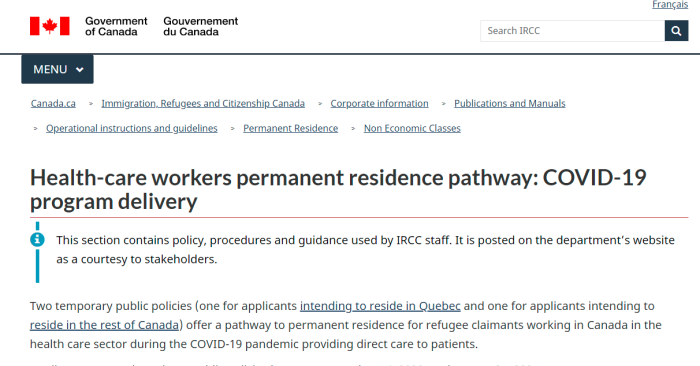
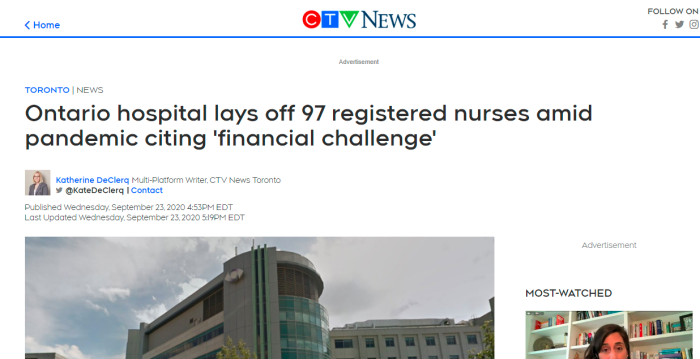
Canada will be giving refugee claimants, (even those who entered illegally), a pathway to permanent residence, for essential health care work. This comes in spite of layoffs at hospitals for not having enough work. Remember, “non-essential” care has been cancelled or delayed.
1. Trafficking, Smuggling, Child Exploitation
Serious issues like smuggling or trafficking are routinely avoided in public discourse. Also important are the links between open borders and human smuggling; between ideology and exploitation; between tolerance and exploitation; between abortion and organ trafficking; or between censorship and complicity. Mainstream media will also never get into the organizations who are pushing these agendas, nor the complicit politicians. These topics don’t exist in isolation, and are interconnected.
2. Mass LEGAL Immigration In Canada
Despite what many think, LEGAL immigration into Canada is actually a much larger threat than illegal aliens, given the true scale of the replacement that is happening. What was founded as a European (British) colony is becoming unrecognizable due to forced demographic changes. There are also social, economic, environmental and voting changes to consider. See this Canadian series, and the UN programs for more detail. Politicians, the media, and so-called “experts” have no interest in coming clean on this.
CLICK HERE, for UN Genocide Prevention/Punishment Convention.
CLICK HERE, for Barcelona Declaration & Kalergi Plan.
CLICK HERE, for UN Kalergi Plan (population replacement).
CLICK HERE, for UN replacement efforts since 1974.
CLICK HERE, for tracing steps of UN replacement agenda.
Note: If there are errors in calculating the totals, please speak up. Information is of no use to the public if it isn’t accurate.
3. Important Links
Ottawa, PR Pathway For “Refugee Claimants” In Health Care
Hospital Layoffs Because Of No Work
Quebec Specific Program For PR Pathyway
2020 Canada Annual Immigration Report To Parliament
Conditions For Eligibility For Program
https://archive.is/aMHri
Designated Country Of Origin (Struck in 2019)
https://archive.is/dShJ9
Employers And Social Insurance Obligations
https://archive.is/gSqeJ
Seasonal Agricultural Work Program
https://archive.is/zMOeQ
4. PR-Pathway A Backdoor Amnesty Program
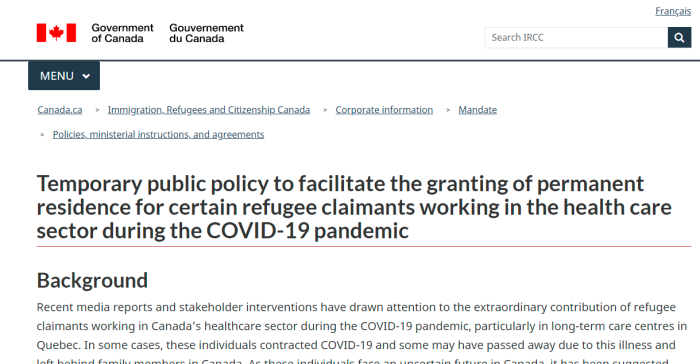
Both failed and pending refugee claimants face uncertainty regarding their future status in Canada. This public policy enables the Government of Canada to recognize their significant contribution and risk to their health during the pandemic by providing them with a more secure future in Canada. In recognition that there may be refugee claimants who contracted COVID-19 and subsequently passed away, spouses and common-law partners of these individuals, who are in Canada, may also be granted permanent residence under this public policy.
As such, I hereby establish that, pursuant to my authority under section 25.2 of the Immigration and Refugee Protection Act (the Act), there are sufficient public policy considerations that justify the granting of permanent residence to foreign nationals who meet the eligibility criteria and conditions listed below.
Based on the public policy considerations, delegated officers may grant permanent residence to foreign nationals who meet the following conditions:
.
A) The foreign national:
.
[1] Is a pending refugee claimant or a failed refugee claimant, who made a refugee claim in Canada prior to March 13, 2020 and continued to reside in Canada when their application for permanent residence was made;
[5] Is not inadmissible other than for any of the following reasons: having failed to comply with conditions related to their temporary stay including having overstayed a visa, visitor record, work permit or student permit or having worked or studied without being authorized to do so under the Act (as long as it was solely as a result of losing their work authorization when a removal order against them became enforceable as specified under Condition A)2 described above); having entered Canada without the required visa or other document required under the Regulations; having entered Canada without a valid passport or travel document. However for the purpose of the granting of the permanent residence pursuant to this public policy, the foreign nationals and their family members are required by subparagraph 72(1)(e)(ii) of the Regulations to provide the Department of Immigration, Refugees and Citizenship Canada any of the documents enumerated under subsection 50(1) of the Regulations. If the foreign national and their family members in Canada are unable to obtain any of the documents, enumerated under subsection 50(1) of the Regulations (e.g., valid passport or travel document), as required by subparagraph 72(1)(e)(ii) of the Regulations,an exemption from this requirement can be granted if these foreign nationals can provide any of the documents described in subsection 178(1) of the Regulations where such alternative document complies with the requirement of subsection 178(2) of the Regulations(specific wording of these provisions is provided in Annex B of this public policy).
[6] Is a pending refugee claimant or claimant who has received a final negative decision from the Immigration and Refugee Board (IRB) and, if they have commenced an application for leave and judicial review of the negative IRB decision in Federal Court, or an appeal in relation to the underlying IRB decision at the Federal Court of Appeal, and who has complied with all other eligibility and admissibility conditions of this public policy, is required, in terms of the final condition of this public policy, to withdraw their refugee claim at the IRB or their appeal of the negative decision by the IRB at the Refugee Appeal Division (RAD), Federal Court application or appeal at the Federal Court of Appeal of the underlying decision of the IRB, in order to be granted permanent residence through the public policy. Should the individual decide not to withdraw their refugee claim at the IRB, their appeal at the RAD, their application at the Federal Court or their appeal at the Federal Court of Appeal, those processes will continue to proceed but their application for permanent residence under this public policy will be refused.
What a huge bait-and-switch. While this program is sold as refugee claimants seeking protection, it’s open to people who came for a variety of reasons. In theory, you can come to Canada as a student or TFW, spend your time here, then turn around and claim asylum.
So, who’s eligible under this program for a pathway to permanent residence? Just from the information provided on this one page:
- Pending refugee claimants
- Failed refugee claimants
- People who’ve exhausted all refugee pathways
- People who’ve entered without a passport
- People who’ve entered without an appropriate visa
- People who’ve stayed after their visiting time had expired
- People working without a visa
- People working after a visa has expired
- People studying without a visa
- People studying after a visa has expired
- Spouses/Common-law partners of the above
- No mention of children, but probably
In short, pretty much anyone who is in Canada — illegally — would have some option to remain and get PR status if they were working (or provide evidence of working) in health care. Just apply for asylum.
Of course, this raises the interesting question of why health care facilities are hiring people who have no legal right to work or remain in the country anyway. It would be interesting to see what kind of proof of health care work is used in these cases.
5. People Entering Illegally Are Eligible
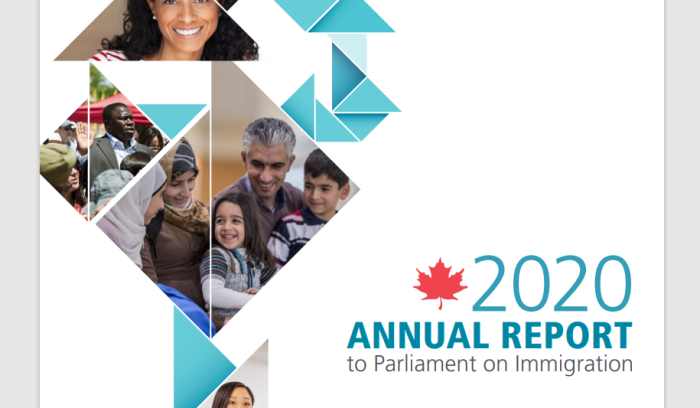
The Canadian Government doesn’t care about its people, and hence, has no real interest in enforcing existing border controls. Fake refugees from the U.S. are still allowed to enter, the S3CA, the Safe Third Country Agreement was struck down, and the concept of a safe country no longer exists.
To summarize, people can apply for asylum in Canada from anywhere, and it doesn’t matter if (or how many), intermediate countries they crossed through. Entering illegally from the U.S. is not important.
6. Family Members Are Eligible As Well
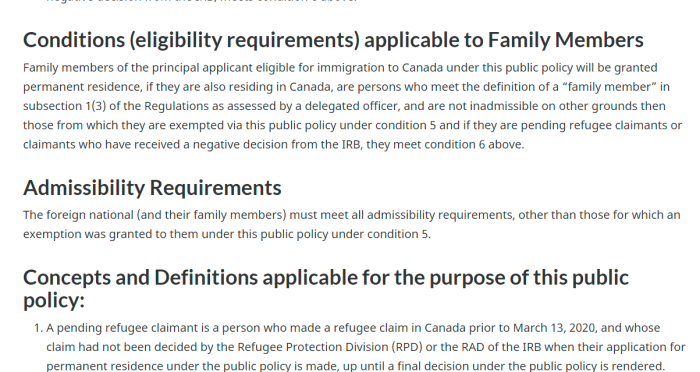
Conditions (eligibility requirements) applicable to Family Members
Family members of the principal applicant eligible for immigration to Canada under this public policy will be granted permanent residence, if they are also residing in Canada, are persons who meet the definition of a “family member” in subsection 1(3) of the Regulations as assessed by a delegated officer, and are not inadmissible on other grounds then those from which they are exempted via this public policy under condition 5 and if they are pending refugee claimants or claimants who have received a negative decision from the IRB, they meet condition 6 above.
It would be nice to see how many people (in total), this would cover, but that information doesn’t seem to be available.
7. Employers And Worker SIN Obligations
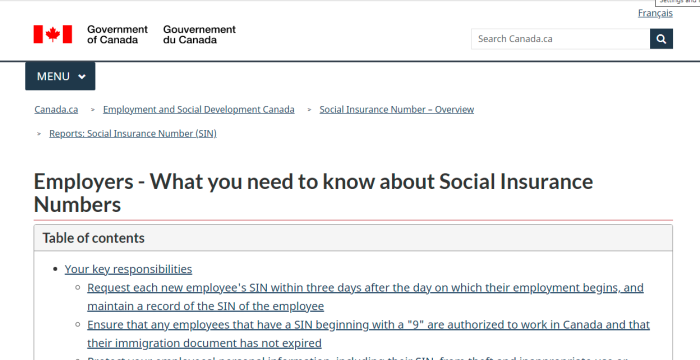
Ensure that any employees that have a SIN beginning with a “9” are authorized to work in Canada and that their immigration document has not expired.
-SINs beginning with a “9” are issued to temporary workers who are neither Canadian citizens nor permanent residents. These SINs are valid only until the expiry date indicated on the Citizenship and Immigration Canada (CIC) document authorizing the person to work in Canada.
–Employers must continue to see the employee’s existing immigration document authorizing them to work in Canada (e.g. work permit, study permit) and verify that the immigration document is not expired.
Employers are required not only to see that the prospective employee is legally allowed to work, but to follow up if not a Canadian or Permanent Resident. How exactly are these “refugee claimants” working in a legitimate field without this paperwork, which is obligated under the law?
If employers are willing to cover for this, would they also lie about the kind of work experience a person has been getting?
8. Open Borders For Agriculture Workers
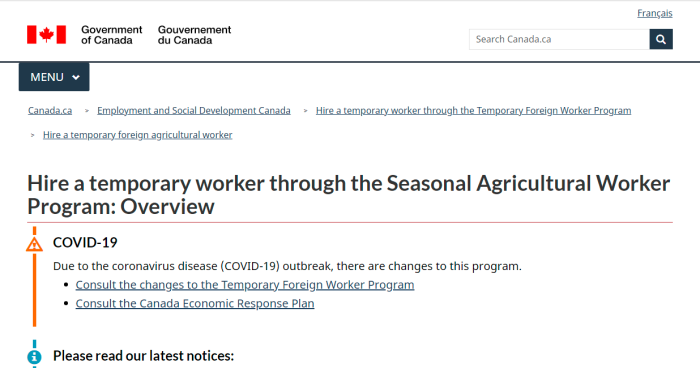
While not directly related to the issue of PR for “refugees”, this is worth an honourable mention. At a time when we have record unemployment in Canada, one would think that a “hire Canadian” policy would be a good idea. Nope. Outsourcing of jobs continues on. Officially, the program is capped, but we’ll have to see if it’s enforced.
9. Theory: Making Amnesty More Tolerable
Just a theory, but perhaps this “health care” approach is about making a mass amnesty easier to pitch to the Canadian public. While being honest about it would cause all kinds of backlash, this can be promoted as an act of necessity.
Do we really need to be importing large numbers of healthcare workers, at a time when job cuts are going on in Canada? Does it really benefit the public to put Canadians at the back of the line? It might, if there was another agenda being pushed.
One has to wonder if these layoffs were done in order to create an artificial shortage, in order to justify this policy.
